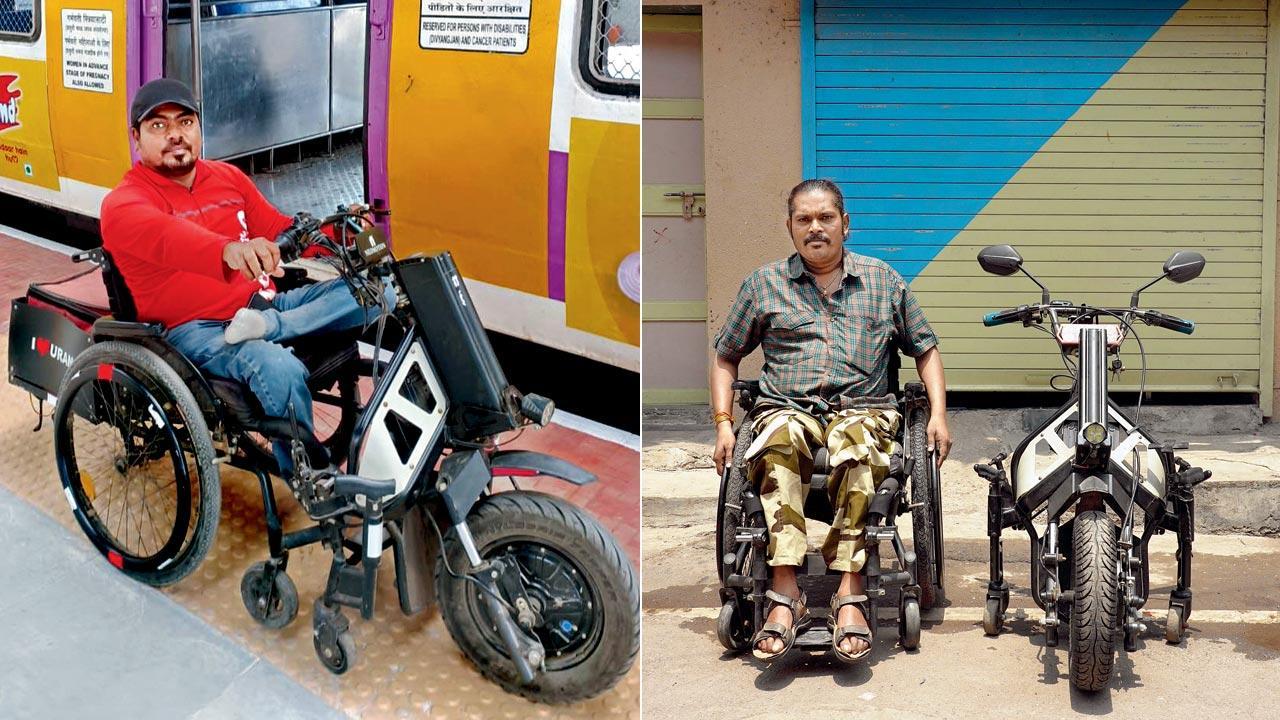Amid the growing competition for on-time deliveries, coupled with structural challenges, companies like Zomato and Amazon are reinventing the terms of delivery for their differently-abled partners

Sandesh Rajguru, a Zomato delivery partner, with his motorbike-convertible wheelchair, on duty; (right) Rahul Shelke, with his motorbike-convertible wheelchair. Pic/Aditi Haralkar
There are times when people refuse to come down and take their food, or even cancel their orders, solely due to a few minutes of delay and inability to deliver at the doorstep. They say, “Aap upar nahi aasakte toh mein kya karu?’[If you can’t make it, then what can I do?],” says Rahul Namdev Shelke, a locomotive-impaired delivery partner from Zomato. The delivery partners or as Zomato calls them, the Hunger Heroes of the country, are often applauded for their quick delivery services. But, what happens when those heroes are differently abled?
In a country with more than five million citizens with disabilities, only 28.3 per cent amount to India’s labour force participation. The primary reason for this marginal difference is the country’s lack of accessibility. “In India, the problem starts from the accessibility of transportation for the disabled people. Only less than nine per cent of the buses, which are one of the cheapest modes of transport are accessible,” said Apoorv Kulkarni, visually impaired and the Head of Research and Centre for Inclusive Mobility at OMI Foundation (a policy research and social innovation Think Tank) over a call. The platform economy, which defines the last-mile services of companies like Amazon, Siwggy, and Zomato, is a booming sector in India. However, the delivery services of differently-abled gig workers often fall prey to the organisational challenges in the country. “The lack of accessible and driveable vehicles, the credit gap for differently-abled workers, access to monetisable funds, need for campaigning the employment opportunities, and inaccessible infrastructure in the city at large, serve as a challenge for these workers,” adds Kulkarni.
 Apoorv Kulkarni, Jayant Singh Raghav, Nipun Malhotra and Siddharth Daga
Apoorv Kulkarni, Jayant Singh Raghav, Nipun Malhotra and Siddharth Daga
Apart from these structural challenges, the customer’s attitudes and temperament, also serve as a hindrance in creating a better working space for them. Moreover, the increasing competition of reaching on time is also a challenge. “Corporate workspaces need to make their workspaces physically and digitally accessible (especially for the visually impaired) for their employees with disabilities. Competing on whose delivering faster is difficult and inhumane for all gig workers, with or without disabilities,” said Nipun Malhotra, born with arthrogryposis, disability rights activist, and the founder of Nipman Foundation, over a call.
On legal grounds, the benefits that are underlined under the Rights of Persons with Disabilities, (RPwD) Act 2016 are often not implemented for these gig workers. “Companies need to implement the Equal Opportunity policy, offering their gig workers the benefit of being treated equally in their workspace,” says Advocate Jayant Singh Raghav, visually impaired, influential advocate for disability rights and the President of Bhumika Trust. “As the customers are not aware of their delivery partner’s type of disability, they would oftentimes come across as insensitive, leading to conflicts with those delivery partners as well as the company.”
So, how are companies like Amazon, Zomato, or Swiggy addressing these challenges? With a growing number of People with Disabilities (PWD) delivery partners on board, the platform economy is gradually changing the working environment and employment rate of the country’s differently abled. Zomato, for instance, has partnered with NeoMotion, a design and manufacturing company for people with locomotive disability, to onboard more than 300 employees with disabilities and provide them with Neo Bolt, an electric motorbike-convertible-wheelchair, for easy deliveries. “With the intent of making outdoor mobility accessible and to reduce the need for depending on someone else for going outdoors, we invented this wheelchair,” says Siddharth Daga, Co-Founder, and Chief Impact Officer of NeoMotion. “We also wished to create livelihood opportunities for our PWD users, for which we partnered with Zomato, who provide on-ground assistance, training, and employment to these candidates.” Zomato also helps these partners during customer conflicts. “Whenever there is a conflict with a customer, we are supposed to call Zomato and inform them about it, after which they negotiate with them directly,” adds Shelke.
With the advent of these wheelchairs, gig workers can deliver their parcels in a smooth and hassle-free manner. However, the issue of the battery life pertains. “Sometimes, when the battery of these wheelchairs dies out, we have to ask someone else to go for the delivery instead. On the whole, the wheelchair and the training offered by the company, made the job much easier for me and helped me come out of my depression and boredom,” said Sandesh Rajguru, diagnosed with paraplegia, and a delivery partner from Zomato.
Apart from Zomato, companies like Amazon and Flipkart have also introduced policies for their disabled gig workers. In collaboration with Mirakle Couriers, Amazon has started employing deaf gig workers to make their deliveries and couriers.
“The platform economy is becoming a domain that can make a positive difference. Despite being only a decade-old industry, they have reflected, where others have failed, especially in making space for the differently-abled gig workers. If there are changes like government interventions for disabled people, accessible infrastructure, and shift in attitudes, then there can be a change at scale for these workers,” Kulkarni signs off.
 Subscribe today by clicking the link and stay updated with the latest news!" Click here!
Subscribe today by clicking the link and stay updated with the latest news!" Click here!










